Top 40+ Account Executive Interview Questions
Preparing for an Account Executive interview? Whether you’re a fresh graduate or a seasoned pro, nailing the interview is key to landing the role. We’ve put together 40+ of the most common and effective interview questions to help you practise and boost your confidence. Let’s get you interview-ready!

General Experience and Skills Account Executive Interview Questions
1. Can you describe your experience as an Account Executive?
2. How do you approach lead generation?
3. How do you prioritize your accounts?
4. How do you measure success in your role as an Account Executive?
5. What do you consider the most important qualities for an Account Executive?
Sales Process and Strategy Account Executive Interview Questions
1. Can you walk us through your sales process?
2. How do you handle objections during a sales call?
3. What’s your approach to cold calling?
4. How do you approach upselling?
5. How do you stay organized while managing multiple clients?
Client Relationship and Problem-Solving Account Executive Interview Questions
1. How do you build relationships with clients?
2. How do you ensure customer satisfaction post-sale?
3. Tell me about a time when you turned a prospect into a long-term client.
4. How do you handle a situation where the client has unrealistic expectations?
5. How do you deal with rejection?
Collaboration and Teamwork Account Executive Interview Questions
1. Describe a time you had to collaborate with other teams to close a deal
2. How do you ensure a smooth transition from sales to account management?
3. How do you handle high-pressure situations or tight deadlines?
4. What motivates you to succeed in sales?
5. How do you keep up with industry trends and competitors?
Problem-Solving and Adaptability Account Executive Interview Questions
1. Can you describe a challenging sale you made and how you overcame obstacles?
2. How do you handle difficult clients?
Client Management and Communication Account Executive Interview Questions
1. How do you communicate complex products or services to clients?
2. How do you build trust with new clients?
3. Tell us about a time you dealt with a dissatisfied customer. How did you handle it?
4. How do you ensure your clients are happy and loyal?
Sales Tools and CRM Systems Account Executive Interview Questions
1. What CRM tools are you familiar with?
2. How do you use data to influence your sales strategy?
3. Can you explain your experience with sales forecasting?
Motivation and Performance Account Executive Interview Questions
1. How do you stay motivated when sales are slow?
2. Describe a time when you exceeded your sales targets. How did you achieve that?
3. How do you handle competing priorities and stay organized?
Industry Knowledge and Learning Account Executive Interview Questions
1. How do you stay up-to-date with industry changes and trends?
2. What do you know about our company and our products?
3. What sets you apart from other Account Executives?
Sales Processes and Methodologies Account Executive Interview Questions
1. Can you explain your sales process from start to finish?
2. How do you track and manage your leads throughout the sales cycle?
3. How do you manage objections during the sales process?
4. What sales software tools are you proficient in, and how do you use them?
5. How do you approach forecasting sales?
Sales Strategies and Techniques Account Executive Interview Questions
1. Describe your experience with upselling and cross-selling.
2. How do you prioritize prospects in your sales pipeline?
3. How do you handle a situation where a prospect isn’t ready to buy yet?
General Experience and Skills Account Executive Interview Questions
In this section of Account Executive interview questions, the interviewer aims to understand your professional background, sales experience, and core skills. Your answers should highlight your ability to manage client relationships, close deals, and adapt to a fast-paced sales environment.
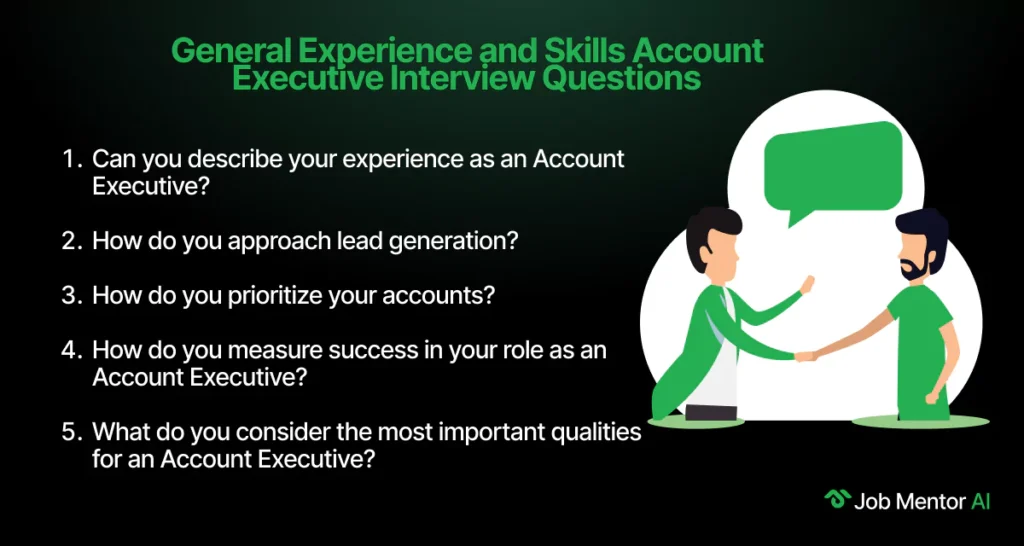
1. Can you describe your experience as an Account Executive?
In my previous role as an Account Executive, I was responsible for managing key accounts, nurturing client relationships, and driving sales. I focused on understanding clients’ needs, offering tailored solutions, and ensuring timely deliveries. My efforts helped increase customer satisfaction and led to a significant rise in repeat business.
2. How do you approach lead generation?
I start by researching the target market and identifying potential clients based on their needs. Using a combination of inbound and outbound strategies, I leverage tools like LinkedIn, CRM systems, and networking events to reach out. Cold calling, emails, and social media engagement are key methods I rely on for nurturing prospects into qualified leads.
3. How do you prioritize your accounts?
I prioritize accounts based on factors like potential revenue, urgency of the client’s needs, and the strategic importance of the client. I use CRM tools to track my activities and ensure that the most critical accounts receive the attention they deserve. I also collaborate with my team to ensure no account is neglected.
4. How do you measure success in your role as an Account Executive?
Success, for me, is measured by meeting or exceeding sales targets, building lasting relationships with clients, and ensuring customer satisfaction. I also focus on acquiring new accounts and increasing revenue from existing clients. Regular performance reviews and feedback from clients help me gauge how well I’m doing.
5. What do you consider the most important qualities for an Account Executive?
I believe the key qualities are communication skills, empathy, persistence, and strong problem-solving abilities. An Account Executive must be a good listener to understand clients’ needs, persistent to push through challenges, and a problem-solver to find the best solutions for the client.
Sales Process and Strategy Account Executive Interview Questions
This section of Account Executive interview questions focuses on your day-to-day approach to sales and client handling. Interviewers want to see how you plan, communicate, overcome challenges, and build long-term client relationships. Your answers should reflect practical strategies, strong communication, and a results-driven mindset.
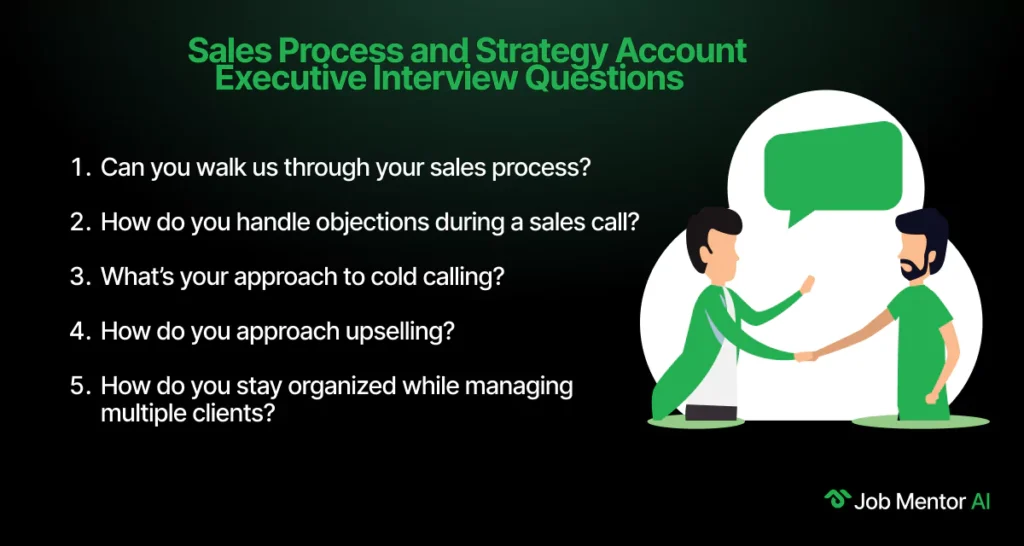
6. Can you walk us through your sales process?
My sales process involves several steps:
- Prospecting – Identifying potential clients.
- Qualifying – Understanding their needs and pain points.
- Presentation – Offering a customized solution and demonstrating value.
- Handling Objections – Addressing concerns to overcome any barriers.
- Closing – Reaching an agreement and finalizing the deal.
- Follow-Up – Ensuring satisfaction and exploring upsell opportunities.
7. How do you handle objections during a sales call?
I listen to the client’s objections carefully, ensuring I understand the underlying issue. I then empathize and respond with a solution that addresses their concern while reinforcing the value of the product or service. I always aim to keep the conversation positive and solution-focused, often asking questions to better understand the root cause of the objection.
8. What’s your approach to cold calling?
I approach cold calling with a focused mindset, first researching the prospect to understand their potential needs. During the call, I introduce myself briefly, explain how I can help, and aim to start a conversation rather than immediately push for a sale. I always aim to keep the conversation friendly and informative.
9. How do you approach upselling?
Upselling works best when I’ve built a strong relationship and truly understand the client’s needs. I focus on identifying additional value they could benefit from and offer solutions that align with their current goals. I ensure that the upsell enhances the client’s experience, not just the sale.
10. How do you stay organized while managing multiple clients?
I rely on CRM tools and task management systems to keep track of important deadlines, follow-up dates, and specific client needs. I also maintain detailed notes after each interaction to ensure continuity in our conversations. Time management is key, and I block out time for focused client work while reserving time for prospecting.
Client Relationship and Problem-Solving Account Executive Interview Questions
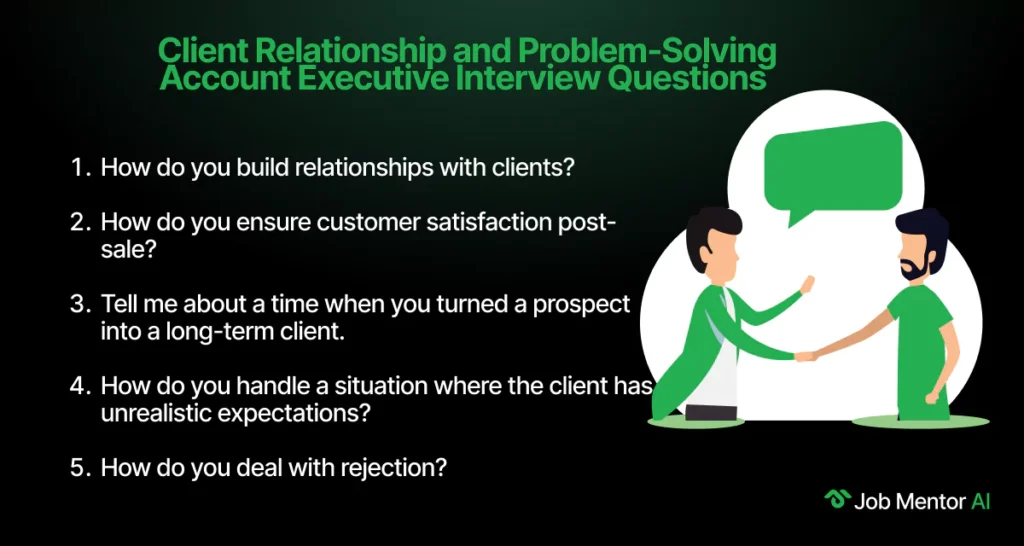
Strong client relationships and problem-solving skills are at the heart of any successful Account Executive role. In this part of the Account Executive interview questions, employers are looking to understand how you build trust, manage expectations, and turn challenges into long-term opportunities. Show how you stay client-focused and solution-oriented under pressure.
11. How do you build relationships with clients?
Building relationships starts with understanding the client’s needs and aligning our solutions to those needs. I maintain regular communication, whether through follow-up emails, calls, or in-person meetings, to show that I genuinely care about their success. Personalizing the relationship by remembering key details also helps strengthen the bond.
12. How do you ensure customer satisfaction post-sale?
After a sale, I maintain regular check-ins with the client to ensure they’re satisfied with the product or service. I also proactively address any issues that may arise and offer solutions to prevent dissatisfaction. Ensuring customer satisfaction leads to long-term relationships and repeat business.
13. Tell me about a time when you turned a prospect into a long-term client.
In my previous role, I worked with a hesitant prospect by patiently understanding their concerns. Through consistent follow-ups and providing detailed case studies, I was able to demonstrate how our services aligned with their business goals. After addressing their concerns and offering a customized solution, they signed a long-term contract.
14. How do you handle a situation where the client has unrealistic expectations?
I have an honest conversation with the client about their expectations and work to manage them by highlighting the limitations of what can be delivered. I focus on providing alternatives that are still in line with their needs but are achievable within the given constraints.
15. How do you deal with rejection?
Rejection is part of the process. I see it as an opportunity to learn. After a rejection, I review the conversation, identify areas for improvement, and use that feedback to refine my approach. Staying resilient and not taking it personally helps me maintain motivation.
Explore these helpful interview guides
Collaboration and Teamwork Account Executive Interview Questions
Successful Account Executives don’t work in silos they collaborate with cross-functional teams and stay adaptable under pressure. This section of Account Executive interview questions highlights how well you work with others, handle deadlines, and stay motivated in a competitive sales environment. Show that you’re a team player who thrives on shared success.
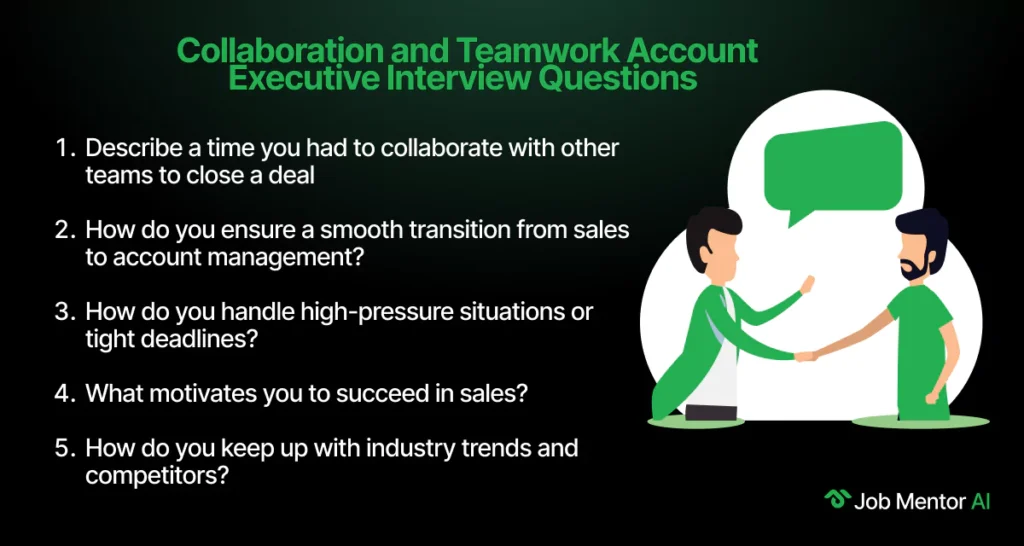
16. Describe a time you had to collaborate with other teams to close a deal
In one instance, I worked closely with the technical team to provide a customized demo for a client who had specific requirements. By collaborating with product specialists and customer support, we created a solution that met the client’s needs, which helped secure the deal.
17. How do you ensure a smooth transition from sales to account management?
I ensure a smooth handoff by providing detailed documentation about the client’s needs, expectations, and any conversations that have taken place. I also introduce the client to the account management team and offer to stay involved during the transition to answer any questions.
18. How do you handle high-pressure situations or tight deadlines?
I stay calm and break down the task into manageable steps. Prioritizing urgent activities and focusing on the most critical tasks first helps me meet deadlines efficiently. Additionally, I regularly communicate with my team and clients to ensure expectations are aligned, and progress is tracked.
19. What motivates you to succeed in sales?
I’m motivated by the challenge of helping clients solve problems and achieve their business goals. The satisfaction of closing deals and the potential for earning commissions also drives me. I thrive in a competitive environment and enjoy seeing measurable results from my hard work.
20. How do you keep up with industry trends and competitors?
I regularly read industry blogs, attend webinars, and participate in networking events to stay up to date. I also monitor competitors to understand their offerings and strategies. This helps me stay ahead of trends and provide better solutions to my clients.
Problem-Solving and Adaptability Account Executive Interview Questions
Adaptability and strong problem-solving skills are essential for any successful Account Executive. This part of the Account Executive interview questions explores how you handle challenges, work with difficult clients, and find creative solutions to close deals. Show your ability to stay calm, think critically, and adapt to different situations.
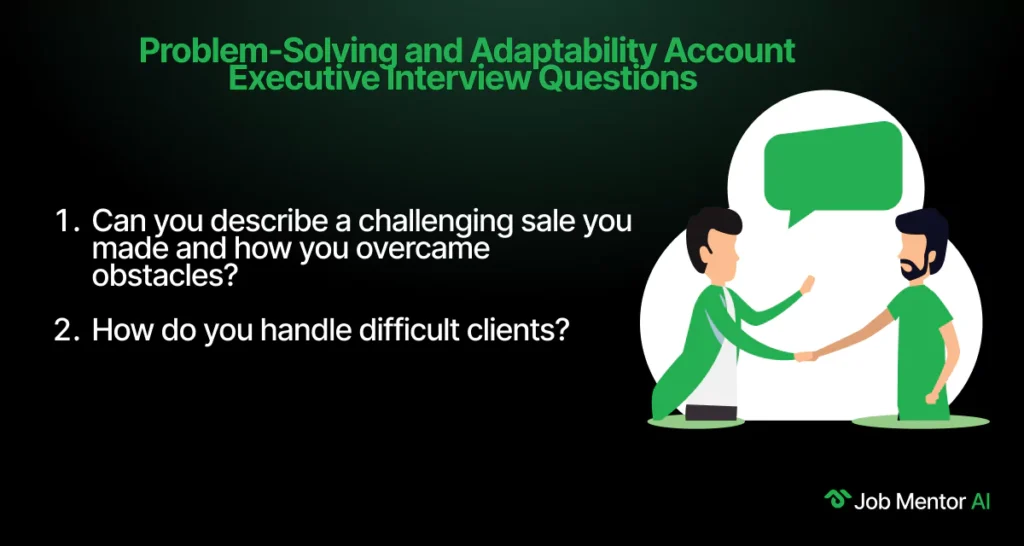
21. Can you describe a challenging sale you made and how you overcame obstacles?
One of the most challenging sales involved a client who had reservations about changing their current system. The biggest hurdle was overcoming the risk of disruption. I worked closely with the client’s team to understand their pain points, and through tailored demonstrations and offering a seamless transition plan, I was able to convince them. The deal ultimately closed, and the client was very satisfied with the new solution.
22. How do you handle difficult clients?
I take a proactive approach by listening to the client’s concerns and addressing them with empathy and understanding. My goal is to offer solutions that will meet their needs and resolve any conflicts. If necessary, I involve the relevant teams to ensure the client receives the best possible service.
Client Management and Communication Account Executive Interview Questions
Effective client management and clear communication are vital skills for any Account Executive. In this segment of Account Executive interview questions, interviewers assess your ability to build trust, convey complex information simply, and handle client concerns with professionalism. Demonstrating empathy, active listening, and proactive problem-solving can set you apart in this role.
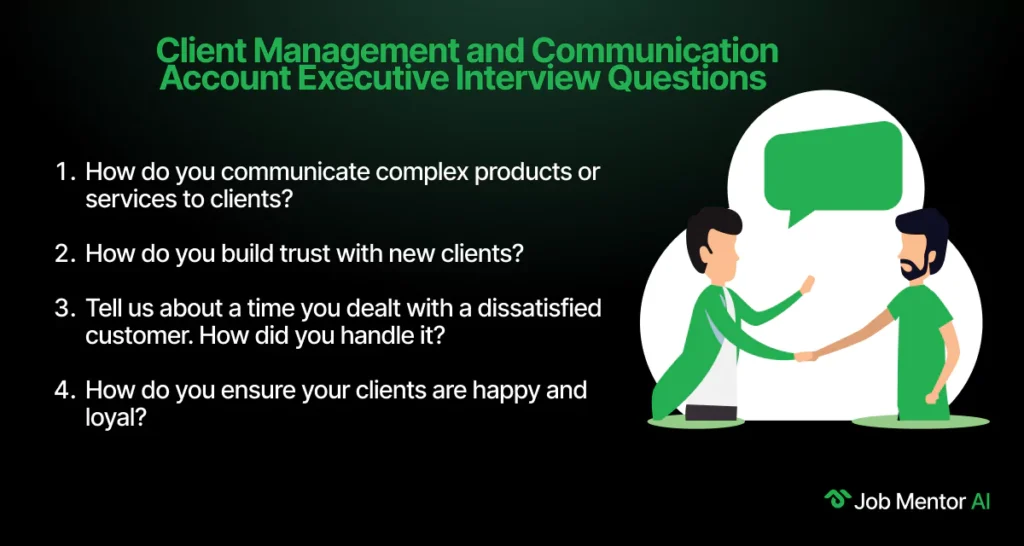
23. How do you communicate complex products or services to clients?
I make sure to simplify the language when explaining complex products or services. I focus on the key benefits that are most relevant to the client’s needs. Using analogies, visual aids, or case studies can also help make the concept easier to understand. I ensure that the client feels comfortable asking questions, and I address them in clear, straightforward terms.
24. How do you build trust with new clients?
Trust is built through consistent and transparent communication. I make sure to always follow through on commitments and provide clients with accurate information. I actively listen to their concerns, empathize with their challenges, and offer tailored solutions that demonstrate our understanding of their unique needs.
25. Tell us about a time you dealt with a dissatisfied customer. How did you handle it?
Once, a customer was dissatisfied with the delivery time of a product. I immediately took ownership of the situation, apologized for the inconvenience, and worked with the logistics team to expedite the delivery. I kept the customer informed throughout the process and followed up after the issue was resolved to ensure their satisfaction. The client appreciated the proactive approach, and it strengthened our relationship.
26. How do you ensure your clients are happy and loyal?
I believe in regularly checking in with clients, not just when there’s an issue. I make sure to provide value by sharing insights, offering new solutions, and asking for feedback. I also track their business goals and align our offerings to help them achieve those goals. A strong relationship built on trust, communication, and constant value creation is key to client loyalty.
Sales Tools and CRM Systems Account Executive Interview Questions
Strong technical knowledge is a must for today’s Account Executives. In this section of Account Executive interview questions, interviewers want to know how well you use CRM platforms, interpret data, and forecast sales. Your ability to work with tools like Salesforce or HubSpot shows how efficiently you manage leads, boost performance, and support your sales strategy.

27. What CRM tools are you familiar with?
I have extensive experience with CRM tools such as Salesforce, HubSpot, and Zoho CRM. I am proficient in using these tools for tracking leads, managing client communications, and analyzing sales data. These systems help me stay organized, monitor progress, and ensure no account is overlooked.
28. How do you use data to influence your sales strategy?
Data plays a critical role in identifying trends, understanding client behavior, and refining my sales strategy. I use analytics to track which leads are converting, which approaches are working best, and where I need to improve. By segmenting data, I can tailor my outreach and engagement efforts to improve conversion rates and maximize sales.
29. Can you explain your experience with sales forecasting?
Sales forecasting is an integral part of my process. I use historical data, trends, and insights from CRM tools to predict future sales performance. I look at the sales pipeline, lead conversion rates, and the current market conditions to make accurate forecasts. This helps me plan ahead, set realistic targets, and allocate resources effectively.
Motivation and Performance Account Executive Interview Questions
Hiring managers often include Account Executive interview questions that explore how you stay driven and perform under pressure. This section focuses on how you keep up momentum during slow periods, hit (or exceed) targets, and manage priorities. Your answers here reflect your resilience, time management, and growth mindset, qualities every great Account Executive needs.
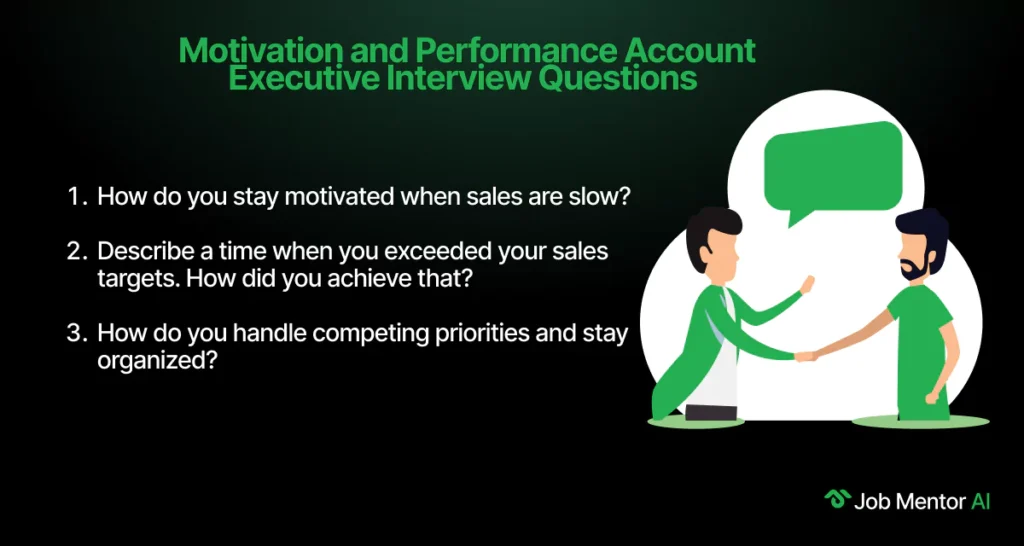
30. How do you stay motivated when sales are slow?
During slow periods, I remind myself that sales cycles can fluctuate. I focus on the process rather than the results and keep myself motivated by setting small, achievable goals. I also use this time to improve my skills, research new prospects, and build relationships. Consistency in effort, even during slow times, helps me stay on track for long-term success.
31. Describe a time when you exceeded your sales targets. How did you achieve that?
In my previous role, I exceeded my sales targets by focusing on both new business and expanding relationships with existing clients. I proactively identified upsell opportunities, tailored solutions to meet client needs, and followed up diligently. My dedication to building strong, lasting client relationships was key to exceeding my targets.
32. How do you handle competing priorities and stay organized?
I prioritize tasks based on their urgency and importance. I break larger projects into smaller, manageable tasks and set deadlines for each. I use time-blocking techniques to allocate specific times for meetings, prospecting, follow-ups, and client work. CRM tools help me stay organized and ensure that no task or opportunity is overlooked.
Industry Knowledge and Learning Account Executive Interview Questions
Staying informed and continuously learning are key traits for a successful Account Executive. These Account Executive interview questions assess how well you keep up with industry trends, understand the company, and differentiate yourself from others. Demonstrating curiosity and a strong knowledge base shows you’re ready to contribute meaningfully from day one.

33. How do you stay up-to-date with industry changes and trends?
I stay up-to-date by regularly reading industry blogs, subscribing to newsletters, attending webinars, and joining relevant networking groups. I also follow industry leaders and engage in online communities to stay informed about market shifts, new products, and sales techniques. Continuous learning is essential to remain competitive.
34. What do you know about our company and our products
I have researched your company extensively and am impressed by your reputation in the industry. Your products are known for their innovation and high-quality standards, and your commitment to customer satisfaction aligns with my own values. I believe that my experience in sales and relationship management could contribute to furthering the success of your products.
35. What sets you apart from other Account Executives?
What sets me apart is my customer-centric approach and focus on building long-term relationships. I don’t just focus on making the sale; I ensure that the solutions I provide genuinely address the client’s needs. My ability to listen, understand, and offer tailored solutions has helped me consistently exceed targets. Additionally, my resilience and adaptability in the face of challenges set me apart in any sales environment.
Sales Processes and Methodologies Account Executive Interview Questions
When preparing for Account Executive Interview Questions, understanding and clearly explaining your sales process is crucial. It shows your ability to manage leads effectively and close deals systematically, which are key skills for an Account Executive role.

36. Can you explain your sales process from start to finish?
My sales process begins with research and prospecting, where I identify potential clients and understand their needs. Then, I reach out through cold calling, emailing, or social selling. Once I establish a connection, I focus on qualifying the lead by identifying their pain points and decision-making process. After qualifying, I present the product or service, address objections, and provide tailored solutions. I close the sale by negotiating terms and ensuring the client is committed. Finally, I follow up post-sale to ensure satisfaction and explore opportunities for upselling or referrals.
37. How do you track and manage your leads throughout the sales cycle?
I track leads using CRM tools like Salesforce or HubSpot, where I input detailed information about each lead. I categorize them based on their stage in the sales funnel (e.g., prospect, qualified lead, proposal). I also set reminders and follow-up tasks to ensure I stay on top of every opportunity. By regularly reviewing and updating the CRM, I can prioritize leads, track progress, and ensure timely follow-ups.
38. How do you manage objections during the sales process?
I manage objections by first listening carefully and empathizing with the client’s concerns. I then ask clarifying questions to ensure I fully understand the objection. Afterward, I present solutions that address their concerns directly. I might provide additional information, share customer testimonials, or offer case studies that showcase how our product has solved similar issues for other clients. I always aim to create a solution that meets both the client’s needs and their budget.
39. What sales software tools are you proficient in, and how do you use them?
I’m proficient in CRM tools like Salesforce, HubSpot, and Zoho CRM for managing leads, tracking sales activities, and forecasting. I also use LinkedIn Sales Navigator for lead generation and prospecting. Additionally, I leverage email automation tools like Mailchimp for outreach campaigns and follow-ups. These tools help me stay organized, improve efficiency, and ensure I meet sales targets.
40. How do you approach forecasting sales?
I approach sales forecasting by analyzing historical data, trends, and pipeline performance. I review the number of leads, conversion rates, and deal stages in the pipeline to predict the likelihood of closing. I also consider external factors like seasonality, market conditions, and competitor activity. Accurate forecasting helps set realistic targets and allows me to allocate resources effectively to maximize results.
Sales Strategies and Techniques Account Executive Interview Questions
In Account Executive Interview Questions, demonstrating your strategic approach to sales is vital. Knowing how to effectively upsell, prioritize prospects, and manage leads who aren’t ready to buy shows your ability to drive revenue and build lasting client relationships.
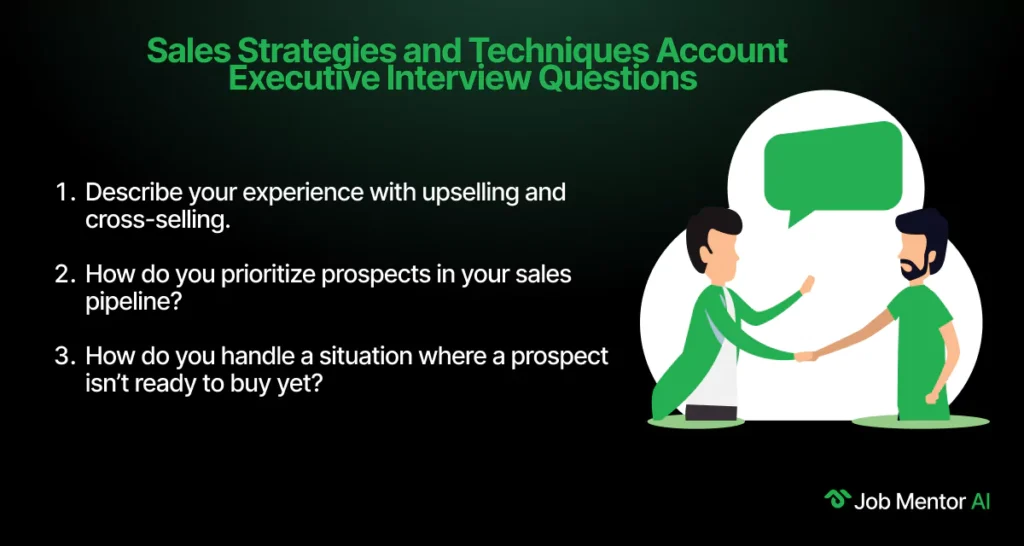
41. Describe your experience with upselling and cross-selling.
Upselling and cross-selling are crucial for expanding client relationships and increasing revenue. I focus on identifying opportunities based on the client’s existing use of the product or service. For instance, I might suggest an upgrade or additional features that can deliver greater value. In cross-selling, I offer complementary products that align with the client’s needs. I ensure that both upselling and cross-selling are framed as beneficial solutions that enhance the client’s experience.
42. How do you prioritize prospects in your sales pipeline?
I prioritize prospects based on their level of engagement, the potential deal size, and their readiness to purchase. I use a lead scoring system within my CRM to evaluate prospects based on their interest, budget, and decision-making authority. High-value leads that are closer to making a decision get my immediate attention, while I nurture longer-term prospects with regular communication and value-driven content.
43. How do you handle a situation where a prospect isn’t ready to buy yet?
When a prospect isn’t ready to buy, I focus on maintaining the relationship and staying top of mind. I continue to nurture the lead by providing valuable content, checking in periodically, and addressing any concerns or questions they may have. I might also set a reminder to revisit the opportunity at a later date when their needs may have changed, or when they are closer to making a decision. Persistence and patience are key in such cases
Ace Your Interview with AI Assistance
Prepare like a pro with our AI Interview Assistant and AI-powered tools designed to help you excel in interviews. Whether you’re a first-time candidate or a seasoned professional, these resources will guide you through the preparation process and give you the confidence you need to succeed.
- Mock Interview Practice: Simulate real interview scenarios and receive instant feedback to refine your responses. This AI mock interview practice helps you build confidence by mimicking real-time interactions and improving your communication skills.
- Question & Answer Generator: Receive tailored questions and ideal answers specific to your job role. The AI interview answer generator ensures you’re prepared for any type of question with intelligent, role-based suggestions.
- Live Interview Assist: Get real-time listening and smart response suggestions during interviews. AI live interview assist helps you stay sharp and responsive, offering context-aware advice as you speak.
Top 40+ Account Executive Interview Questions
Table of Contents
Recommended Blogs
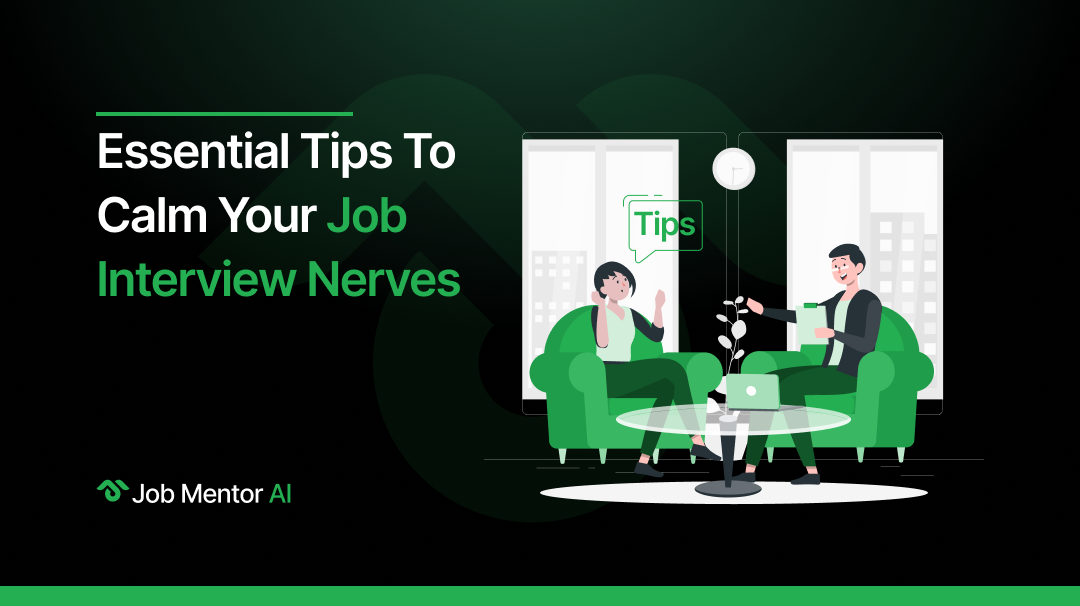
Essential Tips to Calm Your Job Interview Nerves
- Guide
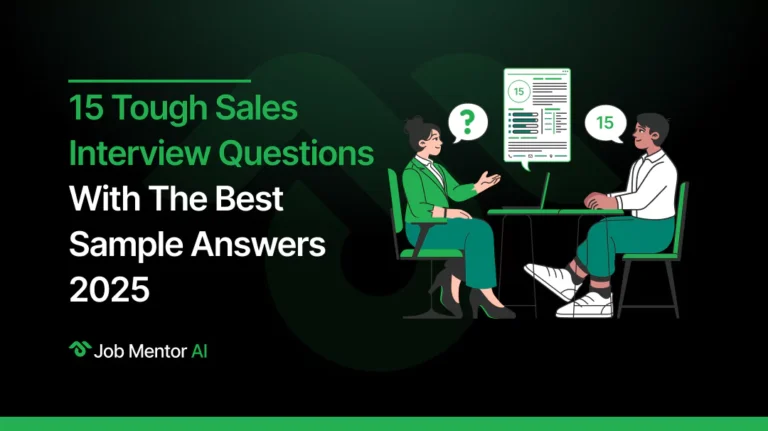
15 Tough Sales Interview Questions with Sample Answers 2025
- Guide

How to Respond to an Interview Request (With Examples & Email Templates)
- Guide

What to Wear for a Job Interview: A Complete Style Guide for 2025
- Guide

What to Expect in a Second Interview: Key Interview Tips
- Guide

Resume vs. Cover Letter with Templates and Examples 2025
- Guide



